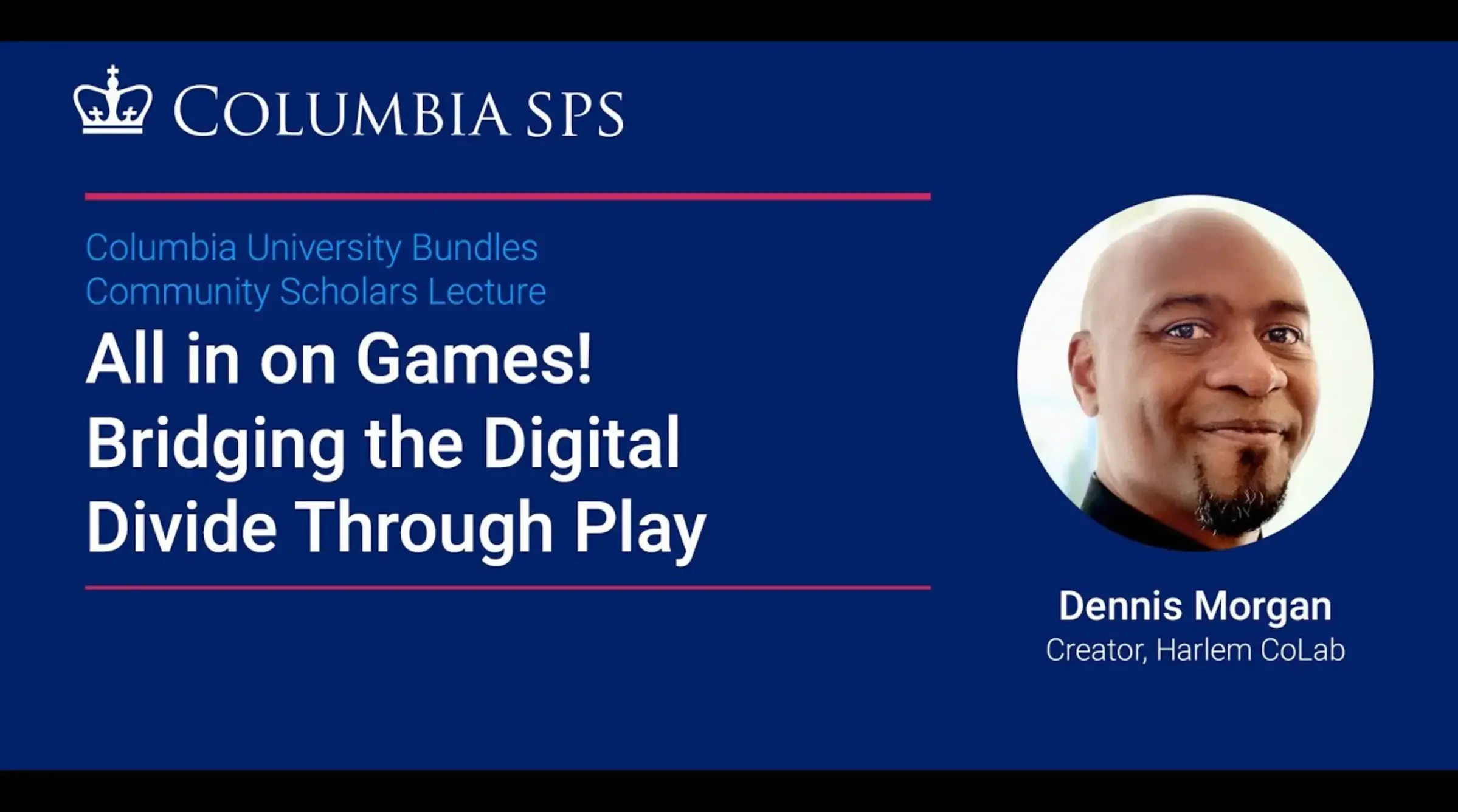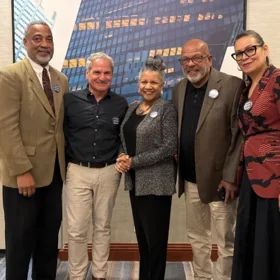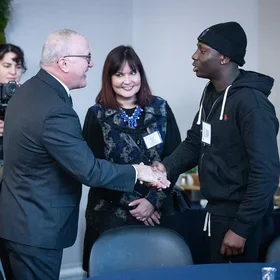A’Lelia Bundles Community Scholar Dennis Morgan aims to provide real-world digital design experiences and training to people in under-resourced communities through his organization, Harlem CoLab. Informed by his previous work in game design and inspired by the innovation and creativity of the digital world, Morgan says he is determined to elevate digital fluency and the ability to leverage digital tools and technology to empower creators and educators of color. “They cannot be left behind," says Morgan. "They must lead!”
Collaborating with tech companies and thought leaders, Morgan organizes workshops, STEM activities, and fairs to improve participants’ access to digital tools and career readiness. With the access, support, and network of the Columbia University A’Lelia Bundles Community Scholars program, he plans to continue to create more opportunities for young learners to fulfill their ambitions in the digital industry. On Thursday, April 28, Morgan will lead a virtual lecture, "All In on Games! Bridging the Digital Divide Through Play"; registration is open to the public.
What does digital fluency mean and how has that applied to your work with Harlem CoLab?
Digital fluency is one's ability to understand what technology to use for a specific application. There's very little analog that still exists today. We're living in a world now that is fully digital and yet there are digital tools out there that a lot of people don't know how to use. But the jobs of the future are in that space. As a part of the entire Harlem CoLab, I have found that in the under-resourced areas within our community, there is a gap in the people’s understanding and fluency of these digital tools.
I've been in New York now for over 20 years and have always lived in Harlem. It's my community. I believe that the Harlem Renaissance will happen again and this time, it will happen digitally, born out of the technologists, creators, and artists that live here.
Tell us about the Harlem CoLab. Why and how did you start it?
Harlem CoLab is a business I started during the pandemic, focusing on bringing technology resources to underserved and under-resourced communities. After my children turned school age, I realized that there was a gap in how much the kids understood about the technology around them, like the phones in their hands, the ATMs all sound them, and the tools that will build Web3. Also, I was aware that our community didn't have a strong focus on technology and STEM careers; there weren’t many tangible ways to empower people with professional and financial sustainability through tech careers.
As the founder of Harlem CoLab, I focus on bringing resources to the community I live in — Harlem. It was small progress at the beginning, but I collaborated with some of my technology partners and made connections with companies to bring resources into the school and have the school community take an active participatory role in bringing a broader understanding of the ways technology impacts children’s lives every day.
Harlem CoLab is not just for children; it expands beyond the children to second, third, and past generations, parents and caregivers as well. When they bring their kids into the school, they are also able to witness this entire experience. We implement programs that allow participants to partner with corporations and technology centers that bring the type of curriculum they're searching for.
The population of the school is starting to diversify and more and more parents are seeing what it means to be involved in their children's education. And my STEM fair, which was called FEST: The Fair for the Environment, Science, and Technology, was in its fifth year prior to the pandemic.
How can you bring the digital space to a level that people can understand?
It’s hard to bring these tools into people's hands, especially those who may or may not be prepared to utilize them. During my first year as part of the Successful STEPS program, of which I lead the technology discipline, I realized there were a lot of people from the community I was serving who either did not speak English or who aspired to work with digital tools but didn’t have immediate access. So I had to reevaluate my strategy. One of the things I learned in this moment was not only is there a language barrier, but they've also never used these tools. They haven't sat in front of a computer to create digital artifacts. I realized moving people from little to no knowledge to full digital fluency is really hard. I came to realize that raising career-ready adults from a basic level to an intermediate or advanced level was extremely difficult. And to e honest, this wasn’t in my wheelhouse - how to lift them up to full fluency. But there are programs out there. I've since been focusing more specifically on partnering with corporations to bring internships and training, up-skilling, which gives individuals financial stability for long-term success. Harlem CoLab sits in the middle between the pool of candidates and the corporations.
You are primarily a game designer. How did you get involved in this industry?
I was born out of the Dungeons and Dragons game design era. When I was in 6th grade, I saw how Dungeons and Dragons did a great job to unpack probabilities and what it meant to tell stories through a game, to have a narrative, and to have somebody who guides the experience. It really started to impact the meaningful decisions in my game designs. At that age, a friend and I were playing it, but we wanted something new. So we thought we'd make our own. In retrospect, It was barely a game, but I got the experience of what it was like to think about building a world.
Fast forward to 2020, I got an opportunity to take classes through the Bundles Scholars program at Columbia University. I thought I’d touch upon my design practice, so I started looking for games. I found them in Teachers College where they were focused on games for learning and education. I took two design classes and dove headfirst into the curriculum and discovered learning theory again. Then I got a call in December where a couple of professors in the CMLTD department asked me if I was interested in teaching part-time. I believe it was the Universe telling me I need to think harder about what I want to do, how I can make an impact, and what I think I can bring to the table. I think games are a good way to develop ideas and concepts that are more accessible for everyone, especially in under-served and under-resourced communities.
What does it mean to you to be a Bundles Community Scholar?
The A’Lelia Bundles Community Scholars program has given me access to information. I think the places where I've really seen my growth are through this network, the people I'm aligning myself with, and the opportunities presented by the faculty and staff. And now it's helping to shape my thinking. I'm getting access to things I hadn't otherwise thought about and often wonder how I will use these new ideas to help propel my business or my thoughts on designing.
What’s next for Harlem CoLab? What do you look forward to in the future when you're done with the Scholar’s program?
I'm all in on games and I would love to create an opportunity for young learners (interested in this industry) to participate in game creation and explore what it means to create digital experiences. I think it allows people to understand digital in a different way that does not have to be a high science.
Morgan is a Columbia University A’Lelia Bundles Community Scholar. The program is administered by the Office of Government and Community Affairs and the School of Professional Studies and enables independent scholars to pursue their lifelong learning aspirations, whether it be completing an independent project or attaining skills in a particular area. The program helps to foster and deepen ties between the University and the many independent members of the cultural and intellectual community surrounding it. The program was named in honor of longtime University Trustee A’Lelia Bundles in 2020.



